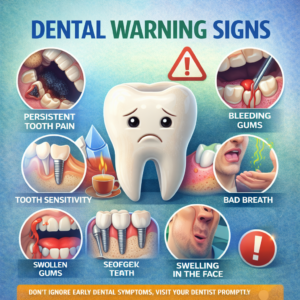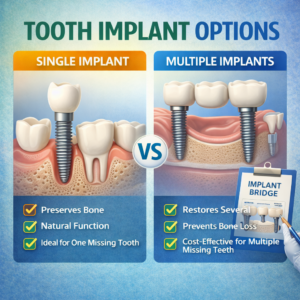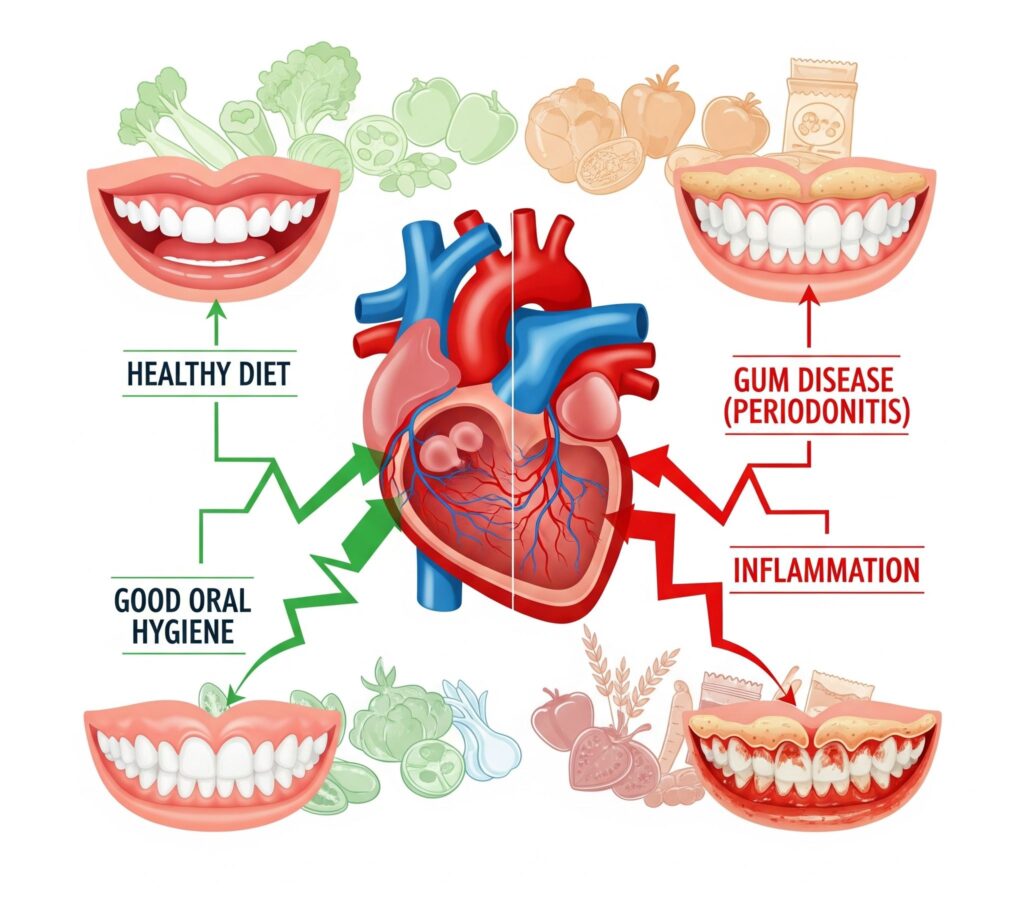Mediterranean diet and gum health: Evidence & Tips
Gum health is often overlooked, yet it plays a crucial role in maintaining overall well-being. Research shows that poor gum health can contribute to systemic issues such as heart disease, diabetes, and even cognitive decline. Recent studies highlight the impact of nutrition, particularly the Mediterranean diet and gum health, in reducing inflammation and supporting oral health. This blog explores scientific evidence, foods for healthy gums, and practical tips that demonstrate the role of Dietetics in dentistry in keeping your smile strong and healthy.
Understanding Gum Health
Healthy gums protect teeth, prevent bone loss, and maintain oral stability. Issues like gingivitis and periodontitis arise due to:
- Plaque buildup and poor hygiene
- Excess sugar intake
- Smoking and stress
- Nutritional deficiencies
Diet plays a significant role here. A balanced diet rich in vitamins, minerals, and antioxidants strengthens gum tissues, reduces inflammation, and lowers the risk of dental caries. That’s where Dietetics in dentistry and a personalized nutrition approach become essential.
Overview of the Mediterranean Diet
The Mediterranean diet is a nutritional pattern inspired by countries like Greece, Italy, and Spain. It emphasizes:
- Fresh fruits and vegetables
- Whole grains and legumes
- Olive oil as the primary fat source
- Nuts and seeds
- Lean proteins like fish and poultry
- Limited red meat and processed foods
Why it matters? It’s one of the most well-studied diets for longevity, heart health, and anti-inflammatory benefits. These same anti-inflammatory and antioxidant properties make it highly beneficial for gum health.
Scientific Evidence Linking the Mediterranean Diet and Gum Health
Several studies suggest that adopting a Mediterranean diet can reduce the risk of gum disease by lowering systemic inflammation and supporting the immune system.
- Omega-3 fatty acids in fatty fish (salmon, sardines) have been shown to reduce gum bleeding and pocket depth in periodontal patients.
- Polyphenols in olive oil, red grapes, and green tea exhibit antimicrobial effects, lowering harmful oral bacteria.
- Vitamin C from citrus fruits and leafy greens strengthens gum tissues and accelerates healing.
- Antioxidants neutralize free radicals that damage gum cells.
According to the British Dental Journal, diet quality directly influences oral inflammation and periodontal outcomes, reinforcing the role of oral health and healthy eating.
Key Mediterranean Foods That Support Gum Health
Here are some essential foods for healthy gums within the Mediterranean lifestyle:
- Olive Oil: Rich in anti-inflammatory polyphenols.
- Fatty Fish (Tuna, Salmon, Sardines): Omega-3s reduce gum inflammation.
- Leafy Greens (Spinach, Kale): High in vitamin C for stronger connective tissues.
- Fruits (Oranges, Strawberries, Grapes): Antioxidants protect against gum disease.
- Nuts and Seeds: Contain vitamin E and healthy fats that repair tissues.
- Whole Grains and Legumes: Stabilize blood sugar, reducing bacterial growth.
Practical Tips to Adopt the Mediterranean Diet for Gum Health
If you want to integrate this diet into your lifestyle, here are simple tips:
- Replace butter with olive oil for cooking.
- Swap red meat with grilled fish or chicken.
- Add a salad rich in leafy greens and olive oil dressing daily.
- Snack on nuts and fresh fruits instead of processed foods.
- Include legumes like lentils and chickpeas for added fiber and protein.
A well-balanced diet plan for dental caries should reduce refined sugars while emphasizing fiber-rich fruits, vegetables, and whole grains. This not only benefits gum health but also prevents cavities.
Role of Dietetics in Dentistry
The growing field of Dietetics in dentistry emphasizes the role of nutrition in preventing and managing oral diseases. In areas like Dietetics in dentistry Salt Lake, dental professionals increasingly collaborate with dietitians to design personalized diet plans.
The role of dietitian in dentistry includes:
- Educating patients about oral health and healthy eating.
- Developing dietary strategies for gum disease and cavities.
- Recommending foods for healthy gums and teeth.
- Supporting recovery after dental procedures.
Other Lifestyle Factors That Complement Diet
While diet is powerful, gum health also depends on:
- Brushing twice a day and flossing daily.
- Limiting smoking and alcohol consumption.
- Staying hydrated to wash away bacteria.
- Regular dental checkups for professional cleaning.
- Managing stress, which can worsen gum inflammation.
The Mediterranean diet and gum health are strongly interconnected. By consuming nutrient-rich, anti-inflammatory foods, you not only protect your gums but also enhance overall well-being. With guidance from Dietetics in dentistry, patients can create sustainable eating habits that lower the risk of cavities and periodontal disease. Pairing a balanced diet with good oral hygiene can truly transform your smile and long-term health.
FAQs
- 1. Can the Mediterranean diet really improve gum health?
- Yes, multiple studies show that anti-inflammatory foods like fish, olive oil, and vegetables reduce gum inflammation and bleeding.
- 2. What is the role of dietitian in dentistry?
- Dietitians help create personalized meal plans to prevent gum disease, manage cavities, and promote long-term oral health.
- 3. Which foods for healthy gums should I eat daily?
- Leafy greens, citrus fruits, nuts, seeds, olive oil, and fatty fish are highly recommended.
- 4. How does diet plan for dental caries differ from a regular diet?
- It minimizes sugary, processed foods and emphasizes whole grains, fruits, and vegetables to prevent bacterial growth and tooth decay.
- 5. Is Dietetics in dentistry Salt Lake different from other regions?
- Not in principles, but in Salt Lake, many dental practices collaborate closely with nutritionists, offering integrated care.





